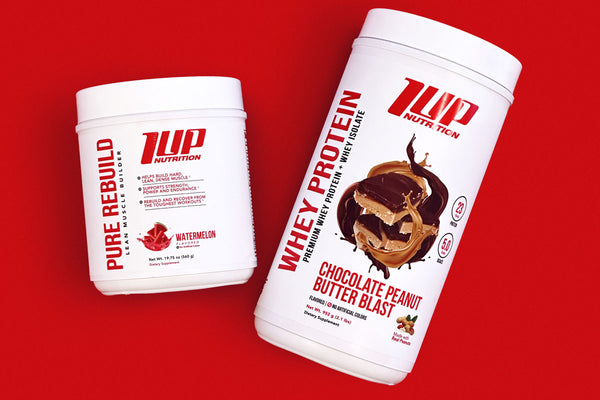Whey protein and creatine are two of the most popular and widely researched supplements on the market. Each one has been used for decades by men and women looking to build strength, improve their physique, and accelerate their results.
Deciding which supplement is the right one to start with can be confusing for individuals new to the gym and can lead into a discussion of “which one is better?”
The truth is that both are effective, deciding which one to begin using first depends on a few factors, including your budget, performance/physique goals, and nutrition plan.
Let’s discuss each of these supplements as well as help you decide which one (or both) to purchase for better results during your transformation challenge.
What is Whey Protein?
Whey protein is one of two proteins found in milk (the other being casein protein). During the cheese-making process, milk is curdled and strained. The curds are collected and the milky-looking liquid remaining is whey.
At one time, whey was considered a useless by-product. Over time, the dairy industry realized something we take for granted today -- whey protein is an incredibly high-quality protein that offers high bioavailability and rapid digestion.
Collectively, this makes it an ideal option for a post workout recovery shake as it provides all the necessary building blocks (essential amino acids) the body needs to stop muscle breakdown and kickstart muscle repair and growth.
What Are the Benefits of Whey Protein?
Whey protein has been extensively researched and shown to[1,2,3,4,5,6]:
- Enhance lean muscle mass (when used in conjunction with resistance training)
- Improve muscle recovery
- Support weight loss
- Reduce feelings of hunger
- Promote cardiovascular health
- Prevent muscle wasting
How to Use Whey Protein
Typically, whey protein is consumed immediately after a workout due to its fast digestion and high BCAA content, but the reality is that you can have a serving of whey protein anytime of the day to help satisfy your daily protein requirements.
It can be a filling snack between meals to help you stay on track with your nutrition plan as well as be a part of your morning or pre-bed meal (e.g. smoothie, protein oatmeal, protein yogurt bowl, protein pancakes, etc.).
The Best Whey Protein Powder
1UP Whey Protein supplies >20 grams of delicious whey protein per serving while being low in carbohydrates, lactose, and fat. We source our protein powders from premier suppliers to offer you a product of unmatched quality and taste.
What is Creatine Monohydrate?
Creatine is a combination of three amino acids (glycine, arginine, and methionine) that is naturally produced by the body. It helps cells stay hydrated, boosts energy (ATP) production, enhances athletic performance, and improves body composition.
In addition to being produced in our bodies, creatine can also be found in certain foods, including red meat, dairy, and fish.
What Are the Benefits of Creatine?
By improving a muscle cell’s hydration as well as its ability to rapidly replenish ATP (the “cellular currency” of energy production), creatine supplements have been shown to:[7,8,9]
- Increase lean muscle mass
- Boost power & strength output
- Enhance performance during high-intensity exercise
- Improve work capacity
- Amplify cognitive function
- Aid recovery
How to Use Creatine Supplements
Typically, 5 grams of creatine is taken either with your pre-workout or post workout shake. However, you can actually take creatine anytime of day since the benefits of creatine don’t happen acutely (i.e. benefits within an hour or two of consumption like citrulline, caffeine, or Nitrosigine). Creatine needs to be taken daily so that your body’s creatine reserves become saturated, which usually occurs 3-4 weeks after taking 5 grams of creatine each day.
Do I Need to Load Creatine?
For a long time, it was popular to “load” creatine (5 grams of creatine taken 4 times per day). While this does lead to quicker saturation (one week vs 3-4 weeks), it can also cause GI distress. Also keep in mind that unless you’re have a powerlifting meet or athletic competition in one week, there’s really no need to load.
Simply take your serving of creatine monohydrate whenever is most convenient.
The Best Creatine Monohydrate Supplement
1UP Pure Rebuild includes a full, research-supported 5,000mg (5g) creatine monohydrate per serving in addition to a full complement of BCAA and essential amino acids (EAAs), electrolytes, and betaine anhydrous (which works in tandem with creatine to support hydration, energy production, and body composition improvements).
Whey Protein vs Creatine: Which is Better?
While whey protein and creatine both offer similar benefits, they way in which they accomplish those outcomes is vastly different.
Whey protein offers an affordable, high bioavailability protein that helps you meet your daily macros. Creatine improves ATP production and hydration.
In other words, one isn’t “better” than the other.
If you’re already eating enough protein from other foods in your diet -- beef, poultry, eggs, dairy, plant proteins, etc. -- then a protein powder may not be necessary. Supplementing with creatine can still offer benefits, however.
Plus, even if you’re already getting enough protein from “whole foods”, whey protein offers a quick and easy option post workout. This can be a huge help for people that aren’t very hungry after training as well as those who may not have time to prep, cook, and eat an entire meal.
Can I Take Whey Protein & Creatine Together?
Absolutely!
Whey protein and creatine work both support workouts, strength gains, and body recomposition, and many individuals combine supplements in a post-workout shake. One of our favorite combos is to mix a serving of unflavored Pure Rebuild with a scoop of 1UP Whey (chocolate eclair is phenomenal!). If you enjoy lighter flavors, consider a serving of pineapple flavored Pure Rebuild mixed with a scoop of 1UP Clear Protein(orange mango).
If you have any other questions about whey protein, creatine, or anything else, we’re always here to help. When you sign up for our transformation challenge and download the 1UP Fitness App, you can access our exclusive Facebook group where you can ask question, get advice, receive encouragement, and connect with coaches and other goal-oriented individuals.
Within the app, you can also get customized training and nutrition (including how much protein you need each day) based on your goals.
References
- Park Y, Park HY, Kim J, Hwang H, Jung Y, Kreider R, Lim K. Effects of whey protein supplementation prior to, and following, resistance exercise on body composition and training responses: A randomized double-blind placebo-controlled study. J Exerc Nutrition Biochem. 2019 Jun 30;23(2):34-44. doi: 10.20463/jenb.2019.0015. PMID: 31337204; PMCID: PMC6651693.
- Frestedt JL, Zenk JL, Kuskowski MA, Ward LS, Bastian ED. A whey-protein supplement increases fat loss and spares lean muscle in obese subjects: a randomized human clinical study. Nutr Metab (Lond). 2008 Mar 27;5:8. doi: 10.1186/1743-7075-5-8. PMID: 18371214; PMCID: PMC2289832.
- Paddon-Jones D, Rasmussen BB. Dietary protein recommendations and the prevention of sarcopenia. Curr Opin Clin Nutr Metab Care. 2009 Jan;12(1):86-90. doi: 10.1097/MCO.0b013e32831cef8b. PMID: 19057193; PMCID: PMC2760315.
- Paddon-Jones D, Westman E, Mattes RD, Wolfe RR, Astrup A, Westerterp-Plantenga M. Protein, weight management, and satiety. Am J Clin Nutr. 2008 May;87(5):1558S-1561S. doi: 10.1093/ajcn/87.5.1558S. PMID: 18469287.
- Pal S, Ellis V. The chronic effects of whey proteins on blood pressure, vascular function, and inflammatory markers in overweight individuals. Obesity (Silver Spring). 2010 Jul;18(7):1354-9. doi: 10.1038/oby.2009.397. Epub 2009 Nov 5. PMID: 19893505.
- Duarte NM, Cruz AL, Silva DC, Cruz GM. Intake of whey isolate supplement and muscle mass gains in young healthy adults when combined with resistance training: a blinded randomized clinical trial (pilot study). J Sports Med Phys Fitness. 2020 Jan;60(1):75-84. doi: 10.23736/S0022-4707.19.09741-X. Epub 2019 Sep 23. PMID: 31565912.
- Kreider, R.B., Kalman, D.S., Antonio, J. et al. International Society of Sports Nutrition position stand: safety and efficacy of creatine supplementation in exercise, sport, and medicine. J Int Soc Sports Nutr 14, 18 (2017). https://doi.org/10.1186/s12970-017-0173-z
- Roschel H, Gualano B, Ostojic SM, Rawson ES. Creatine Supplementation and Brain Health. Nutrients. 2021 Feb 10;13(2):586. doi: 10.3390/nu13020586. PMID: 33578876; PMCID: PMC7916590.
- Hall M, Manetta E, Tupper K. Creatine Supplementation: An Update. Curr Sports Med Rep. 2021 Jul 1;20(7):338-344. doi: 10.1249/JSR.0000000000000863. PMID: 34234088.






